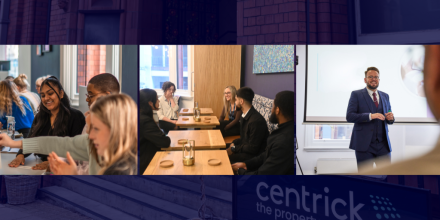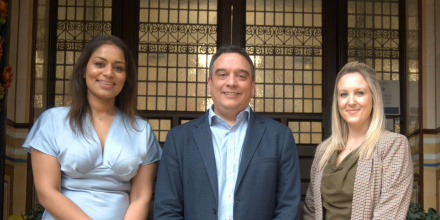May 21st to 23rd saw the return of UKREiiF, the UK Real Estate Investment and Infrastructure Forum. The event, which was held in Leeds, was attended by over 16,000 individuals, 1750 investors, 1750 developers, 1000 occupiers, 275 local authorities and 250 agents. Centrick were proud to host our own exclusive round table at UKREiiF this May alongside Cardinus, Godwin Developments, UrbanSplash and FRC to deliver our insights into the property market.
Whilst at UKREiiF, Centrick provided valuable perspectives on topics such as the evolution of proptech, evolving safety standards across the property sector, the future of BTR and the value of AI in providing meaningful property solutions. If you were unable to attend UKREiiF, don’t worry – here are the ten key takeaways from the Centrick UKREiiF panel on future-proofing your property investments.
Systems Agility in Building Management
In the rapidly evolving field of property management, the ability to adapt systems quickly is crucial. Effective building management increasingly requires the integration of multiple information sources, from occupancy sensors to energy usage data. Systems agility ensures that property managers can efficiently capture, filter, and respond to this information, maintaining operational excellence and ensuring the building’s long-term value. By implementing agile systems, properties can stay ahead of maintenance issues, optimize resource allocation, and enhance tenant satisfaction.
Anticipating Future Trends in the Residential Sector
The residential property market is in a state of constant flux, driven by changing demographics, economic conditions, and lifestyle preferences. To future-proof investments, stakeholders must proactively consider these evolving trends during the design, construction, and management phases. This includes planning for sustainable building practices, integrating smart home technologies, and creating flexible living spaces that can adapt to future needs. By anticipating and preparing for these changes, property investors can ensure their assets remain relevant and attractive to future tenants.
Importance of Resident Engagement
Engaging residents effectively goes beyond fulfilling statutory requirements; it is a cornerstone of successful property management. High levels of resident engagement lead to better tenant retention, fewer vacancies, and enhanced investment returns. Successful engagement strategies include regular communication, community-building activities, and responsive management practices. By fostering a strong sense of community and addressing residents’ needs proactively, property managers can create a more desirable living environment, enhancing the overall value of the property.
Impact of Building Safety Regulator Duties
The Building Safety Act 2022 introduces new regulatory duties that significantly impact property management costs and net operating income. Developers and stakeholders must navigate these requirements with the support of third parties and agents to ensure compliance. This includes implementing safety measures, conducting regular inspections, and maintaining thorough documentation. While these duties may increase operational costs, they also enhance the safety and reliability of the building, ultimately protecting the investment and the residents.
Opportunities in Stock Remediation
The remediation of existing building stock presents a valuable opportunity to upgrade properties and compete with newer developments. This process often focuses on decarbonization efforts, improving energy efficiency, and addressing resident safety. By modernizing older buildings, investors can enhance their appeal and operational efficiency. Upgrading building systems, incorporating renewable energy sources, and improving insulation are some of the ways to achieve these goals. Remediation not only improves the property’s market position but also aligns with growing environmental and safety standards.
Challenges of the Proposed Building Safety Levy
The introduction of the Building Safety Levy poses significant challenges for the construction industry. This levy aims to fund safety improvements but may also contribute to cost inflation, impacting housing affordability and financing. Developers must navigate these financial pressures while addressing the ongoing housing shortage. Strategic planning and cost management will be essential to mitigate the levy’s impact, ensuring that new developments remain financially viable while meeting safety standards.
Enhancing Building Management with Technology
Technological advancements, particularly in artificial intelligence, offer substantial benefits for building management. AI can automate routine tasks, improve communication between property managers and residents, and provide data-driven insights for proactive maintenance. For example, predictive analytics can identify potential issues before they become costly problems, while smart systems can optimize energy usage. By leveraging these technologies, property managers can enhance operational efficiency, reduce costs, and provide a better living experience for residents.
Effective Resident Engagement Strategies
Transparent and regular communication is key to building trust and meeting residents’ expectations. Inspired by customer service standards in other industries, property managers should prioritize timely updates, clear information dissemination, and responsive support. Engaging residents through digital platforms, surveys, and community events can foster a sense of belonging and satisfaction. Effective communication not only improves tenant relations, but also contributes to higher retention rates and overall property value.
Integrating Technology with a Human Touch
While technology plays a crucial role in modern property management, it should complement rather than replace traditional management approaches. A “human in the loop” strategy ensures that AI and other technologies enhance the capabilities of property managers without eliminating the personal touch that residents value. Combining automated systems with human oversight allows for more nuanced decision-making and maintains the essential human element in resident interactions.
Prioritizing Technological Innovation in the Property Sector
To drive progress and attract top talent from other industries, the property sector must prioritize technological innovation. Just as the finance and banking sectors have transformed through digital advancements, the property industry can benefit from similar innovations. Embracing new technologies, such as blockchain for secure transactions or virtual reality for property tours, can set industry leaders apart and enhance the efficiency, transparency, and appeal of property investments. By fostering a culture of innovation, the sector can adapt to future challenges and opportunities, ensuring long-term growth and success.
By addressing these key considerations, property investors can effectively future-proof their investments, ensuring resilience and profitability in an ever-changing market landscape. Are you searching for inspiration when it comes to future-proofing your property investments? Download our pioneering first-party research – Love Where You Live – using the form below to unlock our exclusive insights into the UK BTR sector.










